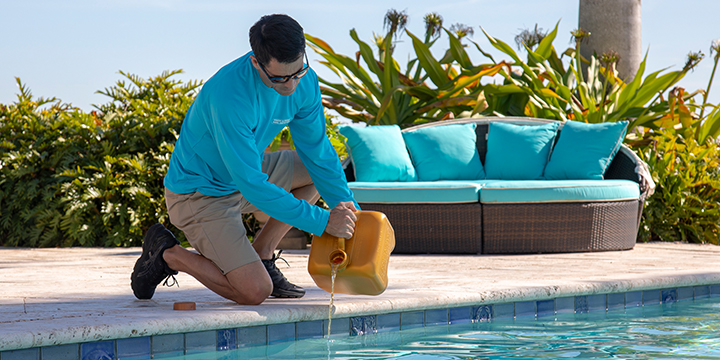Last year, more swimming pools were built across the US than ever before. With many people stuck at home due to the pandemic, it’s perhaps not surprising that the number of home pools soared. Without trivializing the situation, it was a great way to make quarantine more fun. However, due to major changes or events such as the rise in demand and a massive fire at a major chlorine plant, or the 2021 winter freeze in some states, people now face the very real prospect of being unable to chlorinate their pools.
The ‘Poolocalypse’
Described by some as a ‘poolocalypse,’ there is now an unprecedented shortage of chlorine in the US that threatens the use of residential pools and could have quite severe public health implications. Some of those accustomed to spending summer days in their pools have seen the price of a month’s supply of chlorine tablets rise from $60+ to $170 for the same size batch, and that’s if they can get them at all.
The extent of the shortage is that some pool supply stores are limiting chlorine tablet purchases to help manage the demand and prevent panic buying. The number of chlorine tablets required per week varies depending on usage, the environment, and other factors. However, as a general guide, an average pool that’s around 10,000 gallons in size typically requires one to two tablets per week.
Why Is Chlorine So Important?
The use of chlorine in pools is vitally important for several reasons. Firstly, it is used to kill harmful bacteria such as salmonella and E. coli and the germs that cause swimmer’s ear and diarrhea. Without the necessary level of chlorination, these germs would be left to flourish, and the pool water would become unsafe.
As well as the safe sanitization of swimming pool water, chlorine also prevents the build-up of algae. Left unchecked, algae growth makes the water thick and cloudy. If someone falls into the pool, they can become disoriented and struggle to get out. They may also not be seen from the surface. That’s why algae buildup is a safety risk and a leading cause of drowning.
What Has Caused The Chlorine Shortage?
There are a handful of primary causes of the chlorine shortage, and unsurprisingly, one of those is Covid-19. At the height of the pandemic last year, the number of new pools being built in the US increased dramatically, leading to a surge in demand for chlorine products.
At a time when chlorine demand was already high, there was a devastating fire at a major chlorine manufacturing plant in Louisiana that was caused by Hurricane Laura. It’s estimated that the fire destroyed as much as 40% of the chlorine supply for 2021. With the Louisiana manufacturing plant out of action until 2022, that leaves just two domestic manufacturers to bridge the gap between supply and demand.
The combination of these factors has prevented an adequate supply of chlorine tablets from reaching pool stores across the country. The result has been empty shelves and extreme price markups of up to 70 percent compared to 2020.
What Are The Alternatives To Chlorine Tablets?
Fortunately, for pool owners who are struggling to get their hands on the chlorine they need, there are affordable alternatives. Salt pools, which use a process called electrolysis to produce chlorine from salt, are cost-effective and easy to maintain. To convert to a salt pool, all you need is a salt chlorinator and add a number of bags of salt to your water during installation.
Not only does a salt chlorinator produce all of the chlorine you need from the salt in the pool, but it does so while producing far fewer “chloramines” than are present in conventionally chlorinated pools. They are the primary cause of the unpleasant chlorine smell, eye irritation, and dry skin.
Another benefit is that the salt regenerates itself. Rather than having to add more salt to the pool, the original salt molecules are constantly recycled. That means there’s no requirement for a saltwater tank and is another reason why salt pools have become such a highly popular method of pool care.
While it’s a shame for those with conventionally chlorinated pools that something that should be so much fun has become such a hassle, it’s good to know that there are advantageous alternatives out there that can help pool owners overcome the great chlorine shortage of 2021.
Follow Home Inside for more!
